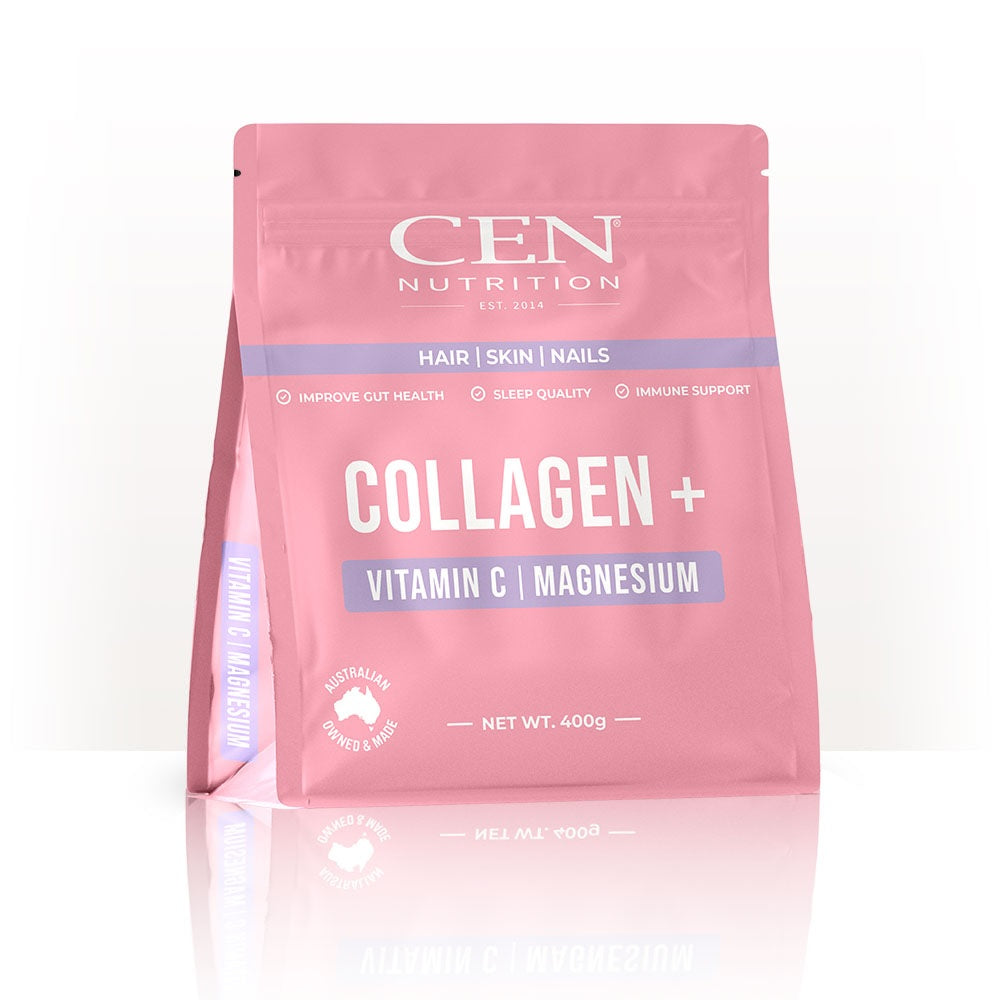Collagen for Women
Collagen for Women
Hydrolysed Bovine Collagen Peptides plus Magnesium & Vitamin C
CEN Collagen For Women is an essential protein in your body that helps promote healthy bones, joints, skin & hair. Our body’s ability to produce collagen naturally slows down from the age of 20 yrs old.
Supplementation through our diet is required to maintain skin, muscles, bones, tendons and cartilage collagen structures. Collagen is the most abundant protein in the body (approx. 30%) and up to 80% of skin!
This makes it the second most abundant substance behind water.
Key Features
- Skin Elasticity & Repair
- Immune System Support & Gut Health
- Healthy Hair & Nails
- Sleep Quality
- Joints, Bone & Tendon Health
- 18 Amino Acids
- Magnesium
- Vitamin C
How is CEN Collagen For Women different from regular collagen?
Collagen peptides differ significantly from macro collagen and gelatine because they are typically more bioavailable and better absorbed into the bloodstream due to their much shorter chains of amino acids.
The Health Benefits of Collagen For Australian Women
Skin Elasticity & Repair
From the age of 20, natural collagen production decreases within the body by approximately 10% each decade. (1,2) Collagen is a protein that aids in skin elasticity, maintaining volume and a youthful appearance. CEN Collagen includes both Type I and Type III collagen, which maintains skin elasticity. Type III is vital for fibroblasts’ function, which aids in elastin production. Both Types I and III collagen are also fundamental in wound healing and overall skin health. (3)
Healthy Hair & Skin
Hair and skin are comprised predominantly of keratin. Amino acids, used by the body the create keratin, are supported by collagen Types I and III to assist in the growth of strong, healthy hair. (4) The dermis layer of the skin contains up to 70% collagen, providing a rich environment to increase the health of the papilla. The papilla is where the hair follicle starts its life cycle and where the most nutrition is gained. Increasing nutrition in the most influential stage of growth may assist in the reduction of hair loss. As collagen production decreases post 20 years of age, wrinkles can occur due to a loss in elastin. Boosting collagen intake of Types I and III, can help preserve that “youthful glow”. (1)
Magnesium
Magnesium is an essential mineral involved in over 300 bodily functions, yet many people, including 1 in 3 Australians, don’t get enough from their diet, leading to symptoms like muscle cramps and fatigue.
Magnesium Bisglycinate, a highly absorbable form where magnesium is bound to glycine, is gaining popularity as a supplement due to its effective absorption and bioavailability, helping to address magnesium deficiencies more efficiently.
Vitamin C
Vitamin C is vital for the body to produce collagen. CEN Collagen contains a quality source of Vitamin C in the form of Sodium Ascorbate, an essential co-factor in collagen synthesis. This form of Vitamin C (Sodium Ascorbate) is more bioavailable and “alkaline” for digestibility (stomach-friendly). (5)
Joint, Bone & Tendon Health
Collagen peptides have been shown to support joint health and comfort. (6,7) Improvements in joint flexibility and mobility was seen in a 2014 study involving elderly women with osteoarthritis. (8) Collagen forms approx. 90% of the organic mass of bone and tendon.
Strong & Healthy Nails
Type I and III collagen may help support nail growth and maintenance. This can provide strength and help prevent brittleness. Nail health can indicate good overall health with sufficient collagen production in the body.
Couldn't load pickup availability


